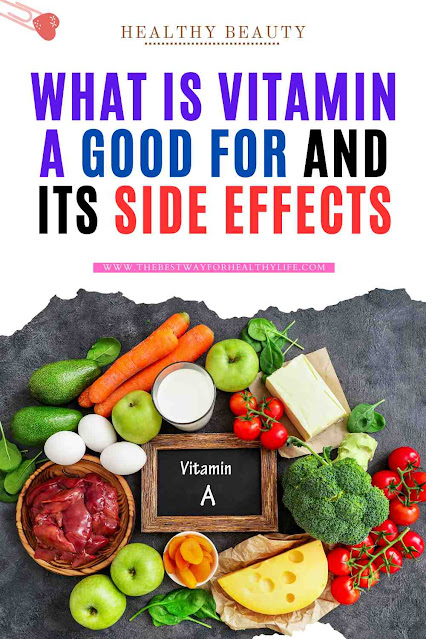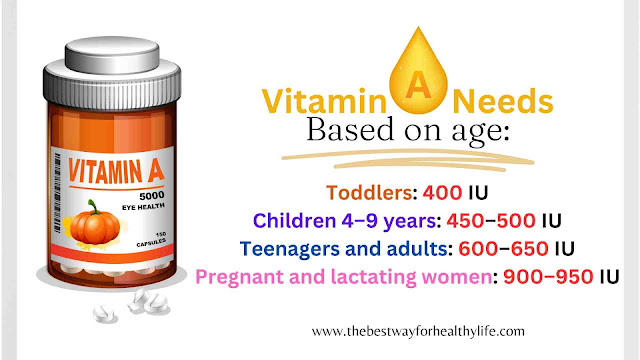What Is Vitamin A Good For And Its Side Effects
 |
| What is vitamin A good for |
What Is Vitamin A Good For And Its Side Effects
What is vitamin A?
Do you know that vitamin A plays a vital role in your body? For example, vitamin A is essential in maintaining reproduction, cell growth, eye health, and immune system improvement.
In addition, vitamin A can treat measles and vitamin A deficiency, including xerophthalmia. Xerophthalmia is a disease in which the eyes experience dryness due to a lack of vitamin A.
Naturally, the need for vitamin A can be met by consuming foods rich in this vitamin, such as carrots, beef liver, chicken liver, cheese, milk, yogurt, eggs, pineapple, mangoes, spinach, or fish oil.
Types of Vitamin A
Many benefits of vitamin A are great for the health of the body, from increasing immunity and maintaining eyesight to reducing the risk of chronic disease. To learn more about vitamin A's benefits, see the following article.
There are two types of vitamin A: retinoids, which come from animal products, and carotenoids, which come from fruits and vegetables. This nutrient is one of the nutrients that play an essential role in the body.
Everyone's need for vitamin A differs depending on age and gender. The following are nutritional adequacy recommendations for vitamin A based on age:
 |
| Daily vitamin A advice based on age |
What Is Vitamin A Benefits?
Vitamin A has various benefits needed by the human body, including:
1. Maintain eye health
One of the most well-known benefits of vitamin A is that it can maintain eye health. In addition, meeting these nutritional needs has been shown to protect the eyes from cell damage.
Not only that, but vitamin A also keeps vision sharp and reduces the risk of developing various eye diseases, such as age-related macular degeneration and night blindness.
2. Strengthen the body's immune system
Besides being beneficial for vision, sufficient intake of vitamin A from food can also keep the immune system functioning properly to be robust against disease attacks.
This is presumably because vitamin A forms immune cells to fight infection and produce strong antibodies.
3. Maintaining the health of the reproductive organs
Vitamin A is a nutrient that is essential for the development of egg cells and sperm. That is why an adequate intake of vitamin A is needed to maintain and increase male and female fertility.
Even so, you also need sufficient intake of other nutrients, such as zinc, antioxidants, iron, selenium, folate, omega-3, and vitamins B and C, to maintain the health of the reproductive organs.
4. Support the growth and development of the fetus
Pregnant women need sufficient daily nutritional intake, including vitamin A, for the growth and development of the fetus to take place optimally.
This vitamin is also vital for keeping the immune system of pregnant women strong, so they are less likely to get sick during pregnancy.
However, intake of vitamin A during pregnancy should be obtained from food. If you want to take vitamin A supplements, pregnant women need to consult a doctor first. This is because high doses of vitamin A are at risk of causing defects in the fetus.
5. Reducing the risk of chronic disease
Vitamin A is known to be an antioxidant, so it helps protect body cells from damage caused by free radicals or oxidative stress.
By meeting the body's need for vitamin A, you can reduce the risk of developing various chronic diseases due to oxidative stress, such as heart disease, diabetes, and cancer, including cervical cancer, breast cancer, lung cancer, and bladder cancer.
Various Sources of Vitamin A
Seeing the various benefits of vitamin A and ensuring that these nutritional needs are met daily is essential.
Most of this vitamin intake can be obtained from various food sources of vitamin A, such as:
1. Vegetables
Vegetables rich in vitamin A include carrots, purple sweet potatoes, spinach, pumpkin, broccoli, beetroot, red peppers, and bell peppers.
2. Fruits
Another best source of vitamin A is Fruits. Fruits that are usually rich in vitamin A are those with a bright color, such as yellow or orange, including papayas, mangoes, pineapple, melon, star fruit, tomatoes, and pomegranate,
3. Fish
Another best source of vitamin A is Fish. The fish that are rich in vitamin A include herring, salmon, bluefin tuna, anchovies, and mackerel.
4. Poultry product
The next source of vitamin A you can get is from poultry products, such as eggs and chicken liver.
5. Red meat
Red meat is also one of the best sources of vitamin A, which you can get from beef or pork.
6. Dairy products
Last but not least, the best source of vitamin A you can obtain from dairy products. These include yogurt, cheese, and milk.
In addition, you can also get vitamin A from other products, such as cereals that have been added to vitamin A and from some supplements.
Generally, the daily vitamin A requirement can be met by adopting a healthy diet. However, in conditions where the intake of vitamin A from food alone is insufficient, for example, due to digestive disorders or being on a diet, the doctor may suggest consuming vitamin A supplements.
Side Effects of Excess Vitamin A
Be sure to take your vitamin A supplement according to the directions on the package. If necessary, discuss with your doctor the proper dosage according to your condition.
Do not exceed the recommended dose to avoid side effects. Even though it rarely happens, you need to be careful because excess intake of vitamin A from supplements or food can cause several side effects, such as:
1. Vitamin A poisoning
Symptoms of vitamin A poisoning include dry skin, dizziness, nausea, headaches, and joint pain.
2. Liver disorders
3. Increase the risk of birth defects
4. Bone disorders
5. Can cause drug interactions
Vitamin A can cause drug interaction, especially if taking blood thinners, birth control pills, acne medications, and chemotherapy drugs.
Therefore, you are not recommended to take random supplements, including vitamin A supplements, especially if you are pregnant or suffer from kidney or liver disease.
To be safer, consult your doctor about whether or not you need to take vitamin A supplements for your condition.
Interactions of Vitamin A with Other Drugs
Interactions that can occur when vitamin A supplements are used with certain drugs include:
- Increased risk of bleeding when used with warfarin
- Increased pressure in the cavity of the head when used with tetracycline, demeclocycline, or minocycline
- Increased risk of developing hypervitaminosis A (excess vitamin A in the blood) when used with other vitamin A derivatives, such as retinoids, tretinoin, or isotretinoin
- Decreased effectiveness of vitamin A when used with cholestyramine, colestipol, or orlistat
How to Take Vitamin A Properly
Remember that vitamin and mineral supplements are consumed to meet the body's need for vitamins and minerals, especially when the intake of vitamins and minerals from food alone is insufficient.
Vitamin A supplements should be taken with food to make them more easily absorbed by the body. Swallow the vitamin A tablets or capsules whole. Do not split, chew, or grind the supplement.
Post a Comment for "What Is Vitamin A Good For And Its Side Effects"